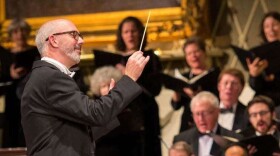
Suzanne Bona
Sunday Baroque Host and Executive Producer, WSHU Music DirectorSuzanne Bona is the host and executive producer of Sunday Baroque, a syndicated weekly radio show of Baroque and early music. She originated the program in 1987 on WSHU Public Radio in her hometown of Fairfield, Connecticut. Sunday Baroque has been distributed nationally since 1999, and is currently heard by nearly a half million listeners every week on more than 300 public radio stations and networks across the United States.
Suzanne is also a classically trained flutist who earned her Bachelor of Music degree from The University of Connecticut. She performs frequently as a soloist and chamber musician, and has especially enjoyed collaborating with some of her musically talented public radio colleagues in performances for listeners in Connecticut and New York, coast to coast in the US, and twice in Guam! Suzanne is a member of the Sylvan Trio, with pianist Greg Kostraba (a radio colleague) and cellist Josh Aerie. Their recordings include the 2020 album, MUSIC FOR FLUTE, CELLO AND PIANO BY WOMEN COMPOSERS, featuring music by Clara Schumann, Lili Boulanger, Princess Anna Amalia of Prussia, Judith Lang Zaimont, Mel Bonis, and Dianne Goolkasian Rahbee.
When she is not making radio or playing her flute, Suzanne’s hobbies include reading, running, cooking, baking and traveling. She is also passionate about the cause of literacy, and is on the Board of Directors of Literacy Volunteers on the Green in New Milford, CT.
-
Do you remember the 1988 Bobby McFerrin song “Don’t Worry, Be Happy”? The extraordinarily talented and versatile musician’s parents were opera singers – Robert McFerrin Sr. was a regular at the Metropolitan Opera, and his baritone voice was dubbed in for Sidney Poitier in the film version of Porgy and Bess. You can hear Bobby McFerrin Jr. leading the Saint Paul Chamber Orchestra while singing one of the cello parts for a Double Concerto by Antonio Vivaldi on Sunday Baroque this week.
-
Music Worcester is in the midst of an ambitious 11-year project to present all of the known works of J. S. Bach. Chris Shepherd is Artistic Director. He talks with Suzanne Bona about why it matters, what it reveals, and how it comes to life today.
-
If you appreciate all the mind-opening resources your local library has to offer, you’ll be pleased to learn that February is Library Lover’s Month – an annual celebration of school, public, and private libraries of all types. We’ll celebrate Library Lover’s Month this weekend with music by Baroque era composers who not only wrote music, they also wrote BOOKS about their craft. It’s on Sunday Baroque this week, starting at 7 a.m. on 91.1, 107.5 and our music stream.
-
We know Braille as a system of writing for the blind, but it was created for music, too.Louis Braille was a musician as well as a scholar, and his system made it possible to read and write music by touch. This weekend on Sunday Baroque, hear music by Baroque-era composers who were blind or visually impaired. Sunday Baroque, starting at 7 a.m. on 91.1, 107.5, and our music stream.
-
From a free youth orchestra in southern Brazil to international stages, recorder player Vladimir Soares has a remarkable musical journey.With help from translator Jessica Oliveria, Vladimir sat down with Suzanne Bona to talk about his life in music.
-
Breaking Barriers is a 2022 album featuring Carlos Bastidas leading Ontario Pops Orchestra in concertos played by several outstanding young soloists. One of them is a Cuban violinist who has performed and competed all over the world, and is now based in Canada. You’ll hear her remarkable artistry on Sunday Baroque this weekend.
-
If one of your new year’s resolutions was to spend less time stressing out and more time relaxing and doing things you enjoy with people you care about, you’ll appreciate the music on Sunday Baroque. It’s soothing and refined, and sets just the right mood whether you’re kicking back with the Sunday newspaper, enjoying a leisurely brunch, or heading off to church.
-
Sunday Baroque is welcoming 2026 this weekend with some of the greatest hits of the baroque era. The beloved favorites include an elegant concerto by Antonio Vivaldi featuring the guitar … gentle harp renditions of a couple of favorites by Johann Sebastian Bach ... and spectacular FIREWORKS by George Friderick Handel. It’s on Sunday Baroque this weekend, starting at 7 a.m. on 91.1, 107.5, and our music stream.
-
Sunday Baroque is celebrating this season in a joyful way, with sparkling baroque Christmas carols... a baroque Christmas Concerto for a newborn baby… and chipper music inspired by Winter Flowers from Scotland. Pour yourself some eggnog, and let the music transport you to a calmer time on Sunday Baroque, starting at 7 am on 91.1, 107.5, and our music stream.
-
The holiday season can be stressful … so this weekend, unplug from all that and treat yourself to some musical stress relief! You can recharge by listening to some of your FAVORITE music from the baroque – greatest hits to draw you in, put a smile on your face, and a song in your heart.










